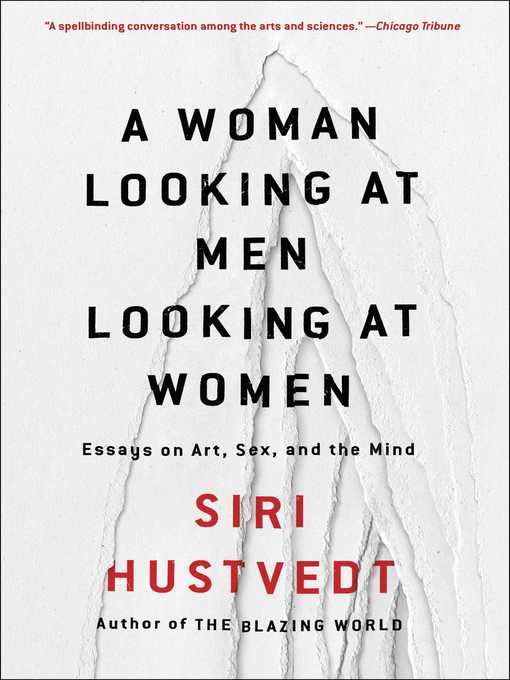
A Woman Looking at Men Looking at Women
Essays on Art, Sex, and the Mind
- اطلاعات
- نقد و بررسی
- دیدگاه کاربران
نقد و بررسی

September 26, 2016
In this erudite collection, novelist Hustvedt (The Blazing World) explores philosophical questions central to the humanities using research from other disciplines, such as biology, feminist theory, and neuroscience. The questions relate to the self, epistemology, and art and literature, among other things. In the middle portion of the book, in an essay that ought to become canonical, Hustvedt examines the problematic underpinnings of current scientific fads such as evolutionary psychology and computational theory of mind. Her lengthy exercise in phenomenology provides a dense, succinct overview of the mind/body problem, which “has haunted Western philosophy since the Greeks.” The questions that preoccupy Hustvedt are the questions of a novelist, but they take consciousness itself as their subject: Where do ideas come from? How do stories get created? What is reflective self-consciousness, and how is it formed? What role do imagination, emotion, memory, and the unconscious play in this thing we call mind? The book conveys the wide range of Hustvedt’s reading as she focuses on the interstices between people; between disciplines; and between concepts such as art and science, truth and fiction, feeling and perception. The research is sound and the scholarship engaging, and the exacting prose turns humorous and almost warm when Hustvedt incorporates her personal reflections, exhibiting, as she says of the artist Louise Bourgeois, “a quick mind, interested above all in its own contents.”

Starred review from October 1, 2016
What are we? That question informs the authors fertile inquiry into mind, brain, and imagination.Taking the perspective of a perpetual outsider who looks in on several disciplines, Hustvedt (Psychiatry/Weill Medical School; The Blazing World, 2014, etc.) gathers recent essays and talks on the intellectual topics that have long occupied her: art and perception, the mind/body conundrum, madness, consciousness, memory, and empathy. She organizes these pieces into three sections: A Woman Looking at Men Looking At Women, which considers the works of Picasso, Koons, and Louise Bourgeois; an exhibition of Robert Mapplethorpe photographs curated by filmmaker Pedro Almodvar; Wim Wenders homage to choreographer Pina Bausch; and the authors experience teaching writing to mental patients and undergoing psychoanalysis herself. The second and third sections, Delusions of Certainty and What Are We? consider more directly issues of mind and consciousness: What is a person, a self? Is there a self? What is a mind? Is a mind different from a brain? Hustvedt feels decidedly unsatisfied by the results of fMRI investigations that map brain activity during such events as reading or looking at art. That research, she maintains, reflects a simplistic correspondence between a psychological stateand its neural correlates, without much thought about further meanings or the philosophical issues involved. Nor does she have patience for the assertions of neo-DarwinistsHarvard psychologist Steven Pinker comes in for repeated criticismwho justify why things are the way they are by privileging nature over nurture and insisting that certain traits (men being better at mathematics than women, for example) are rooted in biology. Hustvedt draws uponand presents with sharp claritya prodigious number of sources, including Kierkegaard (whom she first read when she was 15), William James, Kant, George Lakoff (for his investigation of metaphors), physicist Niels Bohr, neuroscientist Antonio Damasio, and 17th-century scientist Margaret Cavendish, an adamant materialist who took issue with Descartes mind/body dualism, as does Hustvedt.A wide-ranging, irreverent, and absorbing meditation on thinking, knowing, and being.
COPYRIGHT(2016) Kirkus Reviews, ALL RIGHTS RESERVED.

July 1, 2016
A celebrated novelist most recently of "The Blazing Word", a "New York Times" Notable Book that was long-listed for the Man Booker Prize, Hustvedt here explores in nonfiction topics she often explores in fiction, e.g., art, feminism, neuroscience, and how we perceive the world. The eponymous first part of this three-part volume of essays considers the perceptual and gender biases that apply as we judge art, literature, and the larger world. The second part, "The Delusions of Certainty," examines the putative split between the mental and the physical, while "What Are We? Lectures on the Human Condition" looks at what neurological disorders have to tell us about ourselves.
Copyright 2016 Library Journal, LLC Used with permission.




دیدگاه کاربران